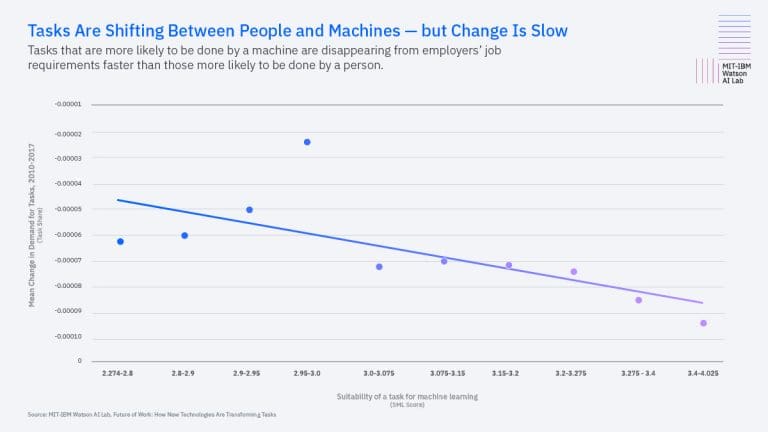
The HR News Wire: As AI Takes Over, the Demand For Creative Jobs Increases
November 12, 2019 Written by Josh Hrala

Compare Providers
Download our outplacement comparison sheet
Request Pricing
Compare our rates to other providers
The HR News Wire is a weekly column that explores breaking HR news and research. This week, we take a look at a new report from the MIT-IBM Watson AI Lab that explains how creative jobs will become more in-demand when AI starts to take over.
There’s a lot of fear surrounding artificial intelligence (AI). Researchers have long speculated that the advancement of these technologies will end up killing off specific jobs and fundamentally changing others. In fact, most experts say that 100 percent of all jobs will be impacted in some way by AI over the next decade.
This shift in the future of work is obviously a stressful one for workers to think about. But when these conversations come up, they typically revolve only around the jobs that will be lost and do not take into account what jobs and roles will actually receive a boost.
Now, the MIT-IBM Watson AI Lab has presented new research that claims that the demand for ‘soft skills’ – creative jobs or jobs that require common sense thinking – will actually become more in-demand, while other jobs – such as those that are susceptible to automation and machine learning – will start to dwindle.
“As new technologies continue to scale within businesses and across industries, it is our responsibility as innovators to understand not only the business process implications, but also the societal impact,” said Martin Fleming, VP and chief economist at IBM, according to VentureBeat.
“To that end, this empirical research from the MIT-IBM Watson AI Lab sheds new light on how tasks are reorganizing between people and machines as a result of AI and new technologies.”
One of the areas is creativity, which will be more in demand than ever after AI automates many workplace tasks.
Let’s take a look at their recent study.
The Study
To come to this conclusion, the team used machine learning (everything IBM does has some sort of machine learning element it seems) to analyze a massive amount of job postings (170 million in total) between 2010 and 2017.
Then, to make the study even more detailed, they took these postings and figured out how many actual work tasks an employee had to do for their given role. In the end, they analyzed over 18,500 tasks in total.
After that, they look at a look at how these tasks shifted over the seven year study period. In the end, they found that workers are now asked to do around four fewer tasks in 2017 than they were required to perform in 2010.
At first glance this seems very confusing, but what it means is that workers have four fewer tasks to complete in their normal roles than that same role had to perform years ago. This means that AI and technology has likely already taken some part of a worker’s job and automated it.
As you can see from this, four tasks (the actual number was 3.7 tasks) over the course of seven years isn’t that much. However, this shift has fundamentally changed the demand organizations have for workers that are in roles that are more susceptible to automation.
In fact, the team found that there was a 46 percent decline in demand for tasks that are suitable for machine learning.
To expound that further, this finding suggests that while AI hasn’t completely wiped out a large swath of tasks yet, employers are seeing the writing on the wall and not putting emphasis on those tasks or roles, causing there to be a decline in demand for those jobs, which kind of means that AI has – effectively – killed off those jobs already even though it really hasn’t.
What Are These Jobs?
So what jobs are being impacted here? What are we specifically talking about?
These are all great questions and the answers can differ based on who you’re talking to. A good way to think about this is to consider jobs that benefit the most from machine learning. For example, tasks that are primed for machine learning disruption are ones that largely have to do with a checking data and making every simple decisions, such as scheduling or credential validation.
On the other hand, you have jobs that are far less susceptible for disruption, such as designers, jobs that require vast industry knowledge, and more creative roles. It’s these jobs that the lab believes will be on the rise while other jobs will start to decline.
Soft Skill Tasks Will Still Be In Demand
“As technology reduces the cost of some tasks, the value of the remaining tasks that make up an occupation increases,” reports MartechSeries.
“Tasks that are grounded in intellectual skill and insight as well as require, to some degree, physical flexibility, common sense, judgment, intuition, creativity, and spoken language have tended to increase in value.”
To underline this, the team figured out exactly how much value these jobs are worth and how much that value increased over the seven year study.
They found that high-wage business and finance jobs – both of which require a high degree of industry knowledge – had a wage growth of $6,387 between 2010 and 2017. On the other hand, they found that jobs that required a lot of manufacturing and production had wages drop by around $5,000 every year.
This is a stark contrast. As one area grew, the other dropped significantly. These trends are great ways to understand what jobs are on the chopping block when it comes to tech disruption.
The team also looked at some other types of creative roles, too. For example, in lower-wage positions – such as hairstylists, fitness training, designers, and roles of that nature – wages increased by $12,000 over the course of the study. This is nearly double the wage growth of the ‘high-wage’ group, which is pretty interesting.
To add a finer point on all of that, the team also found that the value of design skills increased by $8,522.
All of this points to one thing: creative tasks or ones that require a deeper knowledge are pretty much safe – for now – from the AI revolution. In fact, these jobs are primed to thrive while others are primed to fail.
The team reports that these findings also align with a previous study that found that the most sought after skills a worker can have right now are based in behavior instead of tasks. This means that having great flexibility, agility, and the ability to quickly adhere to change are all differentiators for workers looking to advance their careers.
The Takeaways
The real takeaway here is that AI will definitely continue to render some jobs obsolete. But it by no means will decrease the value of others. Quite the opposite. Some jobs, mostly those that are creative or require deep knowledge, will increase in value over the years.
The jobs that are at risk are those that can easily and logically be performed by machine learning and automation. Manufacturing, for one, seems to be a prime area where increase machine learning will have a huge impact. The same can be said for jobs such as warehouse fulfillment, paper-heavy tasks (like scheduling, background checks, etc), and tasks that have to plug into a database.
To look at this a bit deeper, consider scheduling – a task that man admin assistants have to perform on a daily basis. Machine learning can perform this task with ease. It can take into account the calendars of many different people and even learn how some people prefer their meeting times, calculate all of this into an equation, and schedule meetings that are perfect for everyone involved.
This would free up the assistant to do more tasks that require a human touch – soft skill tasks. So, yes, that scheduling tasks is effectively gone, but this will not mean that the assistant is now redundant. Instead, it means that a new task – maybe one we can’t even conceive of now – will takes its place.
Obviously, AI will impact tons of jobs over the next decade just like it has over the last seven years of this study. How exactly this will change the future of work is still hotly debated and will likely continue to be until we see changes slowly happen. Once they start, we should – just like in this study – be able to understand more completely what roles will need to be upskilled to continue to make them relevant.
In need of outplacement assistance?
At Careerminds, we care about people first. That’s why we offer personalized talent management solutions for every level at lower costs, globally.




